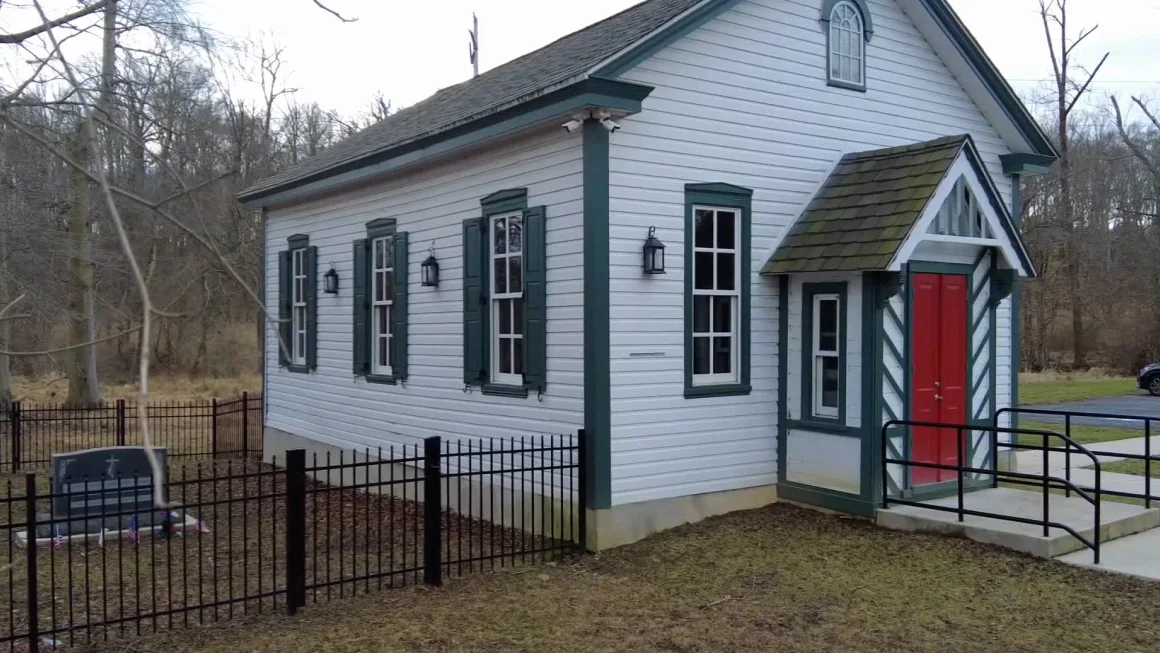By Kaitlyn Schwanemann
For the first time in nearly 30 years, Pandora Anderson Campbell stepped inside Spring Valley African Methodist Episcopal church in Delaware County, Pennsylvania, and couldn’t stop smiling.
“I could feel the spirit of the ancestors. I don’t know how to explain it,” Campbell told CNN.
Five generations of Campbell’s relatives were christened at the church.
Campbell, who also grew up in the church, said she remembers it being a haven for the local community, where parishioners could come to worship, eat the pies her grandmother baked after Sunday sermons, sing and spend time together.
“It was a pillar to the community. People came from everywhere to worship,” Campbell said, adding though the congregation was predominantly Black, the church was open to all.
Lillian DeBaptiste said before she was elected mayor of West Chester, a township in neighboring Chester County, she spent much of her childhood at Spring Valley. Her father, who is now 99, was a master of ceremonies there.
DeBaptiste echoed Campbell’s fond memories of the church, calling it a “little slice of heaven.”
“They were so full of hospitality … as is African American tradition, celebrating not only in spirit but with food. I remember the wonderful, plentiful food,” DeBaptiste recalled to CNN.
Spring Valley AME was built in 1880 and DeBaptiste said the surrounding Black community was primarily made up of farm workers. The church, she said, offered people a place to “put their love, sweat and tears into, and for something they owned – not someone else’s property.”
The church flourished for nearly a century, and renowned artists Andrew Wyeth and his son, Jamie, were among the congregation that filled the pews on Sundays.
But over the years, as the town developed and real estate became too expensive, DeBaptiste said the Black community moved elsewhere in search of better jobs. Attendance dwindled until the church was eventually abandoned in the 1980s.
Then, in the late 1990s, a fire destroyed the parish hall that was once the site of community gatherings, as well as other parts of the church.
At the time, the Concordville Fire & Protective Association and local media suspected it was an arson fire because the building wasn’t secure and didn’t have an electrical system that could have sparked the flames, according to Concordville Safety Officer Fred Field.
Despite investigating, the exact cause of the fire was never found and no arrests were made, Field said.
Although parts of the structure were restored, the church remained vacant until 2014, when the Township of Concord purchased the property and began preservation efforts, with guidance from the town’s historical society.
Campbell said as the town began to restore the church, her then 98-year-old grandmother expressed a desire to visit Spring Valley one last time. The community arranged for a group of people to go to the church and on the day of the visit, John Gillespie, vice president of the township council, told CNN he saw a woman retrieving a shovel from her trunk.
“She said she was looking for the graves underneath the property, and I said, ‘What?’” Gillespie said. “She said, ‘I have death certificates I can show you!’”
Using ground-penetrating radar, the township started investigating the site and ultimately uncovered 10 objects resembling caskets under the land surrounding the church. The township erected a memorial tombstone dedicated, “To all persons known and unknown buried here at Spring Valley AME church.”
Now, after nearly a decade and more than $470,000 spent on restoration, the Spring Valley African Methodist Episcopal church reopened its doors Saturday as an African American history museum.
The site is protected by the Concord Township Historic Preservation Ordinance and is the only Black church in its township, according to the historical society.
Gillespie said the township is collecting artifacts and exhibits to display in the museum, primarily consisting of donations from the church’s founding families.
Jamie Wyeth also contributed his own artwork, as well as the original welcome sign that once greeted the congregation on the church front doors. Gillespie said the township is also collecting items to bury in a time capsule on the property in the coming months.
Campbell said she hopes locals will frequent the reopened site and acknowledge the Black community that made the town what it is today.
“We were there – there were all sorts of blue collar jobs – some of them were sharecroppers. We contributed to the history of Chadds Ford and the Concord Township, and I think this will bring about a remembrance of that,” Campbell said.
She also said she hopes nearby school districts will take students to the museum and keep its legacy alive.
Campbell has been thinking about what to place in the time capsule, hopefully for her great grandchildren to find.
“I hope that when they open it up 100 years from now, or whenever they do it, they’re one race, and that’s the human race. Not divided by the color of your skin,” she said. “This story speaks of the spirit of the church, and the importance that it had in the past, and is now seemingly going to have in the future.”

